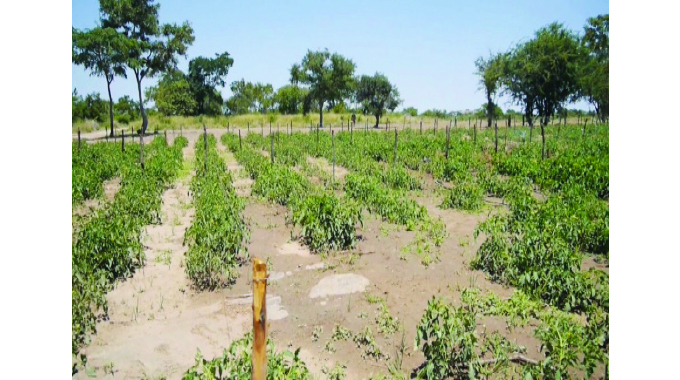
BY STEPHEN CHADENGA
LAST year, six youths in Chirumanzu ward 11 came together to form a horticultural project and named their group Shalom Star Club.
According to Wikipedia, Shalom has many meanings such as peace, harmony, wholeness, completeness, prosperity, welfare and tranquillity.
It can also refer to either peace between two entities, especially between man and God or between two countries, or to the well-being, welfare or safety of an individual or a group of individuals.
In a country ravaged by economic challenges and rising cases of young people turning to dangerous drugs to drown their frustrations, Shalom Club has emerged to fight the vice.
Given the adverse climatic conditions that continue to disrupt agriculture, the group has not just stopped at horticulture.
The group has used proceeds from the garden to diversify into poultry as it endeavours to reduce poverty through climate change adaptation.
Shalom chairperson Hilary Mabhunu said their business approach was made possible by training they received from non-profit organisation Hand in Hand Zimbabwe.
- Chamisa under fire over US$120K donation
- Mavhunga puts DeMbare into Chibuku quarterfinals
- Pension funds bet on Cabora Bassa oilfields
- Councils defy govt fire tender directive
Keep Reading
“Hand in Hand Zimbabwe came at the right time and helped our group in business management, customer care, budgeting and marketing skills among others,” Mabhunu told NewsDay Weekender.
“Imagine we have markets in Mvuma and as far as Zvishavane and Beitbridge for our vegetables,” Mabhunu said.
He added: “From the vegetable earnings, we have managed to save US$10 per month and since we started, we have saved over US$100, which group members can borrow at an interest, of course.”
Mabhunu said the money has seen the group members being able to do other individual projects such as chicken rearing and egg production through skills obtained from the Hand in Hand jobs creation programme.
Despite being in a rural setting usually associated with poor living standards, the members have smart mobile phones which they use not only to network with other young farmers from different areas, but to market their products and share knowledge on mitigating the impact of climate change on their agripreneurial projects.
“We are so busy with our income-generating projects such that in this area, bad behaviour among youth is very low and we usually read about drug abuse in other places on social media platforms,” he said.
Shalom is not the only group that benefited from Hand in Hand interventions in Chirumanzu district.
A group of women also comprising six members, Kushinga Star Club in ward 20, has a successful indigenous poultry chickens and goat production venture.
“Hand in Hand Zimbabwe helped us form the group in 2018 under the Motivated and Entrepreneurship Youth (MEY) project,” said group chairperson Rutendo Chakafana.
The group also saved US$10 per month, and after six months managed to buy each member a goat as part of agriculture diversification in a largely changing environment caused by the effects of climate change.
“Right now, we have dug two fishing ponds as we move to make sure each member has at least one (fishing pond) in our planned fish farming venture,” she said.
“As women, we have been uplifted to be economically independent.”
Chakafana said group members who have already received training in feed mix formulation for both broilers and free range poultry also intended to embark on sunflower production so that they would reduce costs of buying poultry feed.
“Our target as a group is to rear 1 000 Sasso chickens and each member should have at least 500 birds,” she added.
Chakafana said the club supplies supermarkets in Mvuma and Chivhu as well as tuckshops and restaurants in the surrounding Mavise business centre.
“We also supply boarding schools and at one point, a boarding school in Murambinda requested us to supply 70 crates of eggs per week,” she said.
Another group in ward 22, Rising Star Club, consisting of seven women, is also into indigenous poultry chicken production and has also diversified its farming activities to include gardening, among others.
It is not only in agriculture projects Hand in Hand has chipped in as the organisation has also assisted a group of seven women in Mvuma, ward 13, Rujeko Star Club, which is into detergents manufacturing.
The group also saves money from its project, which is used as a revolving fund to finance other individual projects.
“Besides production of dish washing liquids, foam bath and toilet cleaners, we have used proceeds from the manufacturing side to diversify into poultry projects at individual level,” says chairperson Shuvai Mutsambwa.
The women and youth in all the clubs told NewsDay Weekender that besides entrepreneurship skills, Hand in Hand Zimbabwe had also imparted training in life motivation, sexual reproductive health as well as gender and environmental awareness.
Hand in Hand chief executive Felix Tete said his organisation’s intervention in communities was driven by the need to give people “fishing rods and not fish”.
“People who are motivated and are already into projects are the ones that can be easily strengthened to identify opportunities, do business planning and market their products among other skills,” Tete said.
Since its establishment six years ago, Hand in Hand has over the years implemented the MEY project, Community Upliftment Project, Green Enterprises Project and Jobs for Zimbabwe.
The organisation currently supports communities in seven districts including Chirumanzu, Bulilima, Chikomba, Gwanda, Lupane, Nkayi and Shurugwi.
- Follow Stephen on Twitter @jagganox78










